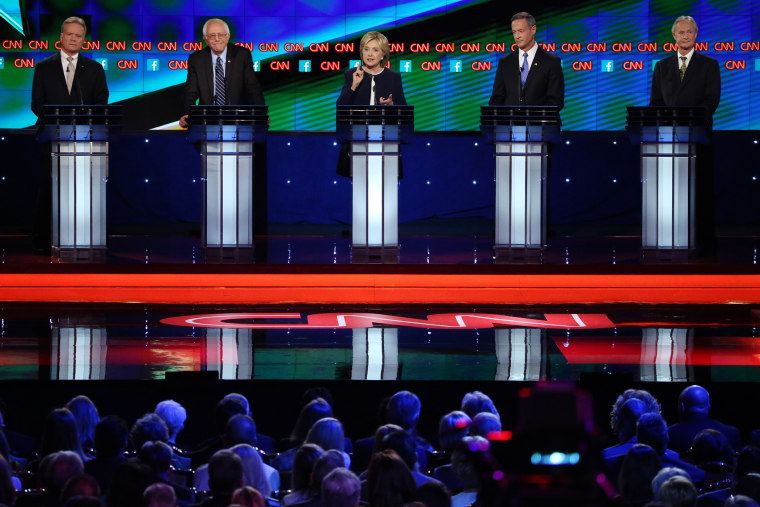Every debate is going to have an oddball question or two that isn't related to a specific issue, and when done right, these questions offer some insights into the candidates' personalities. And last night, in the very last round of the Democratic debate, Anderson Cooper posed a good one:
"Franklin Delano Roosevelt once said, 'I ask you to judge me by the enemies I have made.' You've all made a few people upset over your political careers. Which enemy are you most proud of?"
I've seen some mixed reactions to this, but I actually like the question. We've all heard the expression about judging people by the company they keep, but I believe it was Oscar Wilde who joked about judging people by the quality of their enemies -- a maxim that has its own appeal.
And the answers were, fortunately, rather informative. Lincoln Chafee talked about his confrontations with the coal lobby. Martin O'Malley pointed to the NRA. Bernie Sanders drew applause when he noted, "As someone who has taken on probably every special interest that there is in Washington, I would lump Wall Street and the pharmaceutical industry at the top of my life of people who do not like me."
In one of the debate's more memorable moments, Jim Webb replied, "I'd have to say the enemy soldier that threw the grenade that wounded me, but he's not around right now to talk to." The former senator then smirked a bit.
But note Hillary Clinton's answer, which was well received by the Las Vegas. From the transcript:
COOPER: Secretary Clinton? CLINTON: Well, in addition to the NRA, the health insurance companies, the drug companies, the Iranians. (LAUGHTER) Probably the Republicans. (LAUGHTER) (APPLAUSE)
Remember, the exact wording of the question was, "Which enemy are you most proud of?"
ProPublica's Alec MacGillis noted just how "striking" it was to hear Clinton identify "the party that'll hold House if she's elected" as the enemy she's most proud of.
It reminded me a bit of Clinton's campaign kick-off speech in June and her stylistic differences from President Obama. When Obama launched his presidential bid in 2007, he made no reference to Republicans or even the Bush/Cheney administration he sought to replace. When Clinton announced her candidacy this year, she was only too pleased to name names, calling out Republican failures and radicalism repeatedly throughout her speech.
Indeed, it's hard to even imagine Obama appearing on a national stage and identifying Republicans as the enemy he's "most proud of." Clinton, however, is a very different kind of pugilist.
This is neither praise nor criticism. Some Democratic voters like a candidate like Obama, who sees our partisan differences as superficial, and who wants to find common ground and a sense of common purpose. Other Dems like a candidate like Clinton, who sees Republicans as a foe to be defeated and worthy of contempt.
Either way, the former Secretary of State may have excelled in the area of international diplomacy, but she has no illusions about how to approach a relationship with America's radicalized political party.
